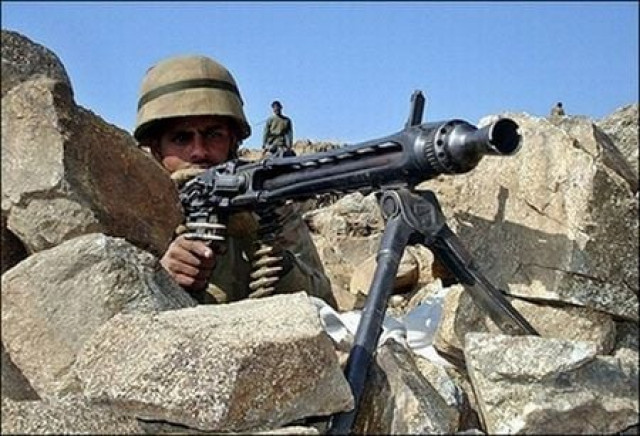I have received some emails in reference to my general comments on The Express Tribune and in particular to my article “Whose country is this anyways.” The authors of those emails have deemed me a traitor and an all round general sell-out or worse a Mossad-CIA plant, who has been inserted to “defame and malign Pakistan’s most disciplined institution.”
In short, the thrust of the accusations go something like this.
“How dare you question the benefits of Army officers? You no appreciation of the sacrifices they make, the love for Pakistan that they have in their hearts!”
One gentleman added that he would “starve his children so that the Pakistani Army can play its role to defend the nation.” How can anyone compete with such a strong sense of patriotism? Regardless of what I say and do, I will always come off as a traitor!
However, is this even patriotism? Is the relationship between the individual and the state limited to an outpouring of blind support for one institution? Or can someone be patriotic while also critical of the nations armed forces?
We like to present the “Army” as one monolithic institution. However, like any institution it is far from uniform. Present day actors have a monopoly over claiming the “Army” as their own, as it will continue to function long after they have passed on. The only individuals that can actually claim the Army as their own are the public at large, for it’s to protect their interests that the institution is funded and granted a monopoly in the use of arms. Indeed the institution that they represent and the privileged position that society has granted high ranking military officers, should not be equated to the individual. The position of authority and the responsibility invested in the offices of the COAS or DG ISI should ideally be greater than the individual himself.
By extension, the institution is much larger than the individuals that inhabit it. Therefore, any criticism of the Army, is not necessarily a criticism of the institution, rather it’s a criticism of the policies implemented by the actors which happen to be in power at any given time. It seems to me that those in power are merely leveraging nationalism to justify their actions, equating property development and military land grabs with the security of Pakistan.
Likewise there is a big difference between criticising perks and privileges and equating such criticism with treachery. Neither does such criticism take any thing away from supporting our troops who are fighting and dying for their country.
However, in an environment where fake degrees are being uncovered, the government of the day is busy politicking rather than governing, MNA’s and MPA’s are suffering from verbal diarrhea; the role of the military high command goes largely unquestioned.
Why are we hesitant to question or hold those who wield power and influence in the name of the country that we inhabit accountable? Is it because in our chaotic and somewhat dysfunctional state the military represents the only institution to be proud of? Is it because many people have relatives in the military and are hesitant to criticize them? Or is it because we are scared of the consequences of openly voicing criticism?
However, the most important question is why call for greater transparency and accountability of the military to begin with? After all, the plots, the benefits, the 10% quota in the civil service, the appointment as ambassadors and state position, the large military-industrial complex that helps retired officers to find plush jobs etc, is a small price to pay to individuals who lay their life on the line. But where do we draw the line? Where do we say enough is enough?
I was in Fairy Meadows, Nanga Parbat in 2005. On my final day, a military helicopter arrived with mess staff carrying main dishes, cutlery and tables. They promptly laid it out in the grounds of a privately owned hotel without the permission of the owner. Then a second helicopter landed, and this time a group of officers with their hunting rifles strode off to take there places amongst the pre-set feast. Ignoring the sign in the corner that stated hunting was not allowed in this region, the generals prepared themselves for the hunt. The local community was fuming with anger and resentment; however they had little choice but to facilitate their “guests”. Are the expenses incurred on public expense for a helicopter ride up to Fairy Meadows justified? Or what of the moral implication of hunting in an area declared a hunting free zone? Can we draw the line here or are such extravaganzas justified?
Then they are other examples, such as demolishing barracks in Lahore to construct a General’s colony, or the case of Chashma Goth (and here) where the military baton-charged the local community, or the case of Jangua Town or the case of DHA-Islamabad which has established a joint venture with Bharia Town, where both organizations have been accused of land grabbing. Or what of the conversion of land allocated for testing and camping into a housing scheme in Rawalpindi. Or what off all the villagers who were the original inhabitants of DHA-Islamabad who have yet to receive compensation?
I have always been skeptical of those individual who demand respect rather than earn it. Whether generals, politicians or religious leaders. However, while questioning politicians is (rightly) considered socially acceptable, there seems to be some pact between the military and society that I seemed to have forgotten to sign up to, whereby regardless of the action, we patiently and obediently consider every decision that flows through the upper echelons of the military as correct, and our patriotic duty to support it.
How does not publishing the details of the military’s allocation of the budget serve Pakistan’s national security? One can be vague regarding sensitive programs, but the entire budget? Why does keeping the salary, perks and pension of the military high command a secret, make our country any safer? Why does the military get exemption from land taxes in cantonment areas? Is it not enough that the people of Pakistan, who pay their taxes and are indebted to the international community to the hilt, pay for their wages and perks, should also subsidize their local communities?
So why call for greater transparency and accountability? If the military in Pakistan considers itself as the nations most disciplined institution, then surely it must also accept that it must be held to a higher standards. By holding those in uniform accountable to a higher standard than other organs of the state, only then can it truly claim to be the nations “most disciplined institution”. For those who serve their country, society owes them a debt of gratitude. However, we have to draw a line where those who extract benefit from the public’s purse appreciate the reality that surrounds them. I may be a traitor based on certain interpretations of patriotism, however, if the military wants respect, then it should be seen to earn rather than demand it.



COMMENTS
Comments are moderated and generally will be posted if they are on-topic and not abusive.
For more information, please see our Comments FAQ